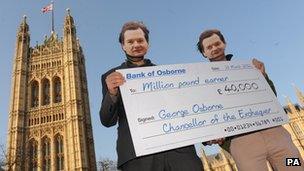It's easier to tax pensioners than rockstars
- Published
- comments

The chancellor told BBC Radio 4's Today programme that the 50p tax rate he inherited from the last Labour government was a "con" that the rest of the world "laughs at".
What he meant by that is the people it was supposed to tax have been adept at exploiting devices to avoid paying it. So, he claims, it yielded very little and cutting it to 45p in the pound will cost virtually nothing.
Hmmm. The statistics produced by HMRC indicate the yield from the tax was small. But that doesn't mean its abolition won't be expensive.
As I pointed out here on Wednesday, the £3bn question is whether a direct £3bn reduction in the tax payable by the 250,000 people earning more than £150,000 a year gives them a strong enough incentive to stop exploiting tax reliefs and loopholes.
And if they won't volunteer to be less aggressive in tax planning, will the planned new ceiling imposed by government on the exploitation of tax reliefs, combined with the impact of a General Anti-Avoidance Rule, external, turn out to be effective?
We are not going to know the truth of any of this for years, because the tax cut and ceiling on reliefs won't come in for a year, and the anti-avoidance rule will take longer to put in place.
Also, because of the lag in tax payments built into the self-assessment system, it will be the start of 2014 before we have any serious clue about what kind of money is being raised from the lower rate.
In the meantime, the government expects to lose £2.4bn of precious revenue in the current year, as the 250,000 highest earners defer dividends and bonuses to take advantage of the deferred lower tax rate and load up with tax reliefs before a ceiling is put on them.
Which is why, as I mentioned on Tuesday, it is odd that the chancellor deferred the introduction of the tax cut and the clamp-down on reliefs.
He knows that one of the iron laws of tax policy is that those who can avoid paying tax - wealthy individuals, multinationals - will do so.
Take Glaxo, which is back building a new factory in the UK for the first time in 40 years, largely because of a reform called the "patent box" that reduces the tax payable on British exploitation of some forms of intellectual property.
Then there are the changes to the taxation of multinationals, the Controlled Foreign Company Rules, that are supposed to be tax cuts, but which the Treasury expects to raise £300m of additional revenue - presumably because fewer companies will have an incentive to move abroad.
Of course the vast majority of British people and British companies have limited ability to avoid tax or to relocate abroad to escape it altogether.
What Mr Osborne didn't say Thursday morning, though he might have thought it, is that his freeze on age-related allowances - his so-called "granny tax" that raises more than a billion pounds a year - is a completely bankable tax-raising measure, for the simple reason that most pensioners can't change their domicile to Monaco.
So being chancellor involves two often conflicting judgements: which tax measures will actually be effective in raising money; and which tax measures will be seen to be fair?
He can reach into grannies' pockets, although many would say that's not fair. Whereas he might well be widely cheered if he did the same for the super-rich, except that their pockets seem to be sewn shut.
The other challenge is that the consequences of tax changes are dynamic, not static.
If businesses and business leaders who benefit from tax cuts use some of the extra income they've retained to make new job-creating investments, as Glaxo has done, then the benefits of their tax saving will be more widely shared.
But, at the risk of stating the obvious, just as it's difficult to force the wealthiest to pay tax, so it's impossible to force them not to hoard all their extra cash.